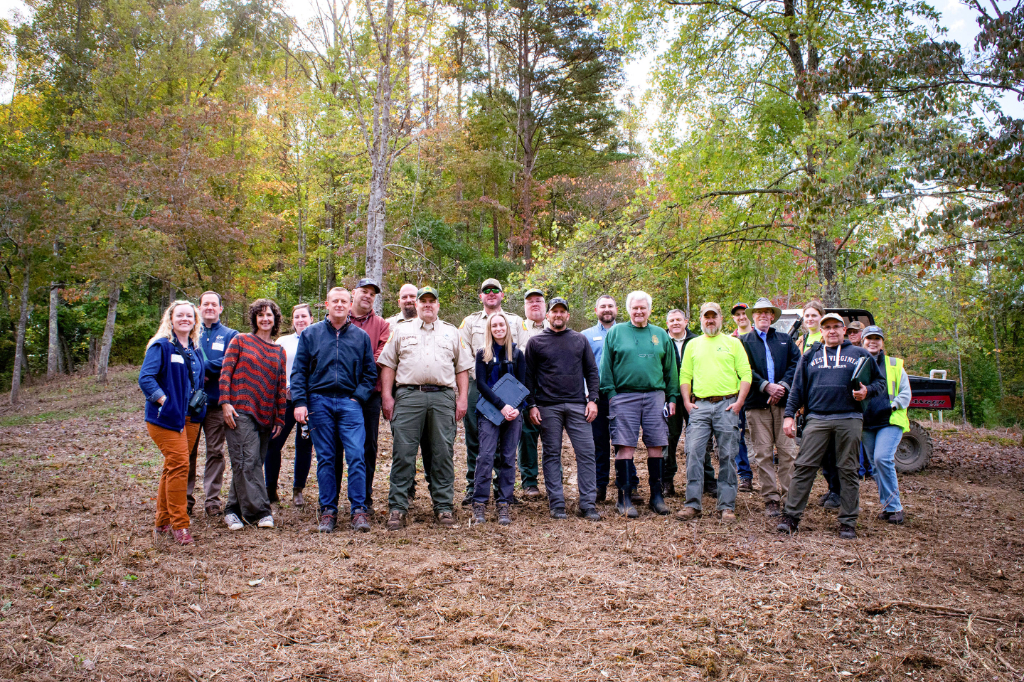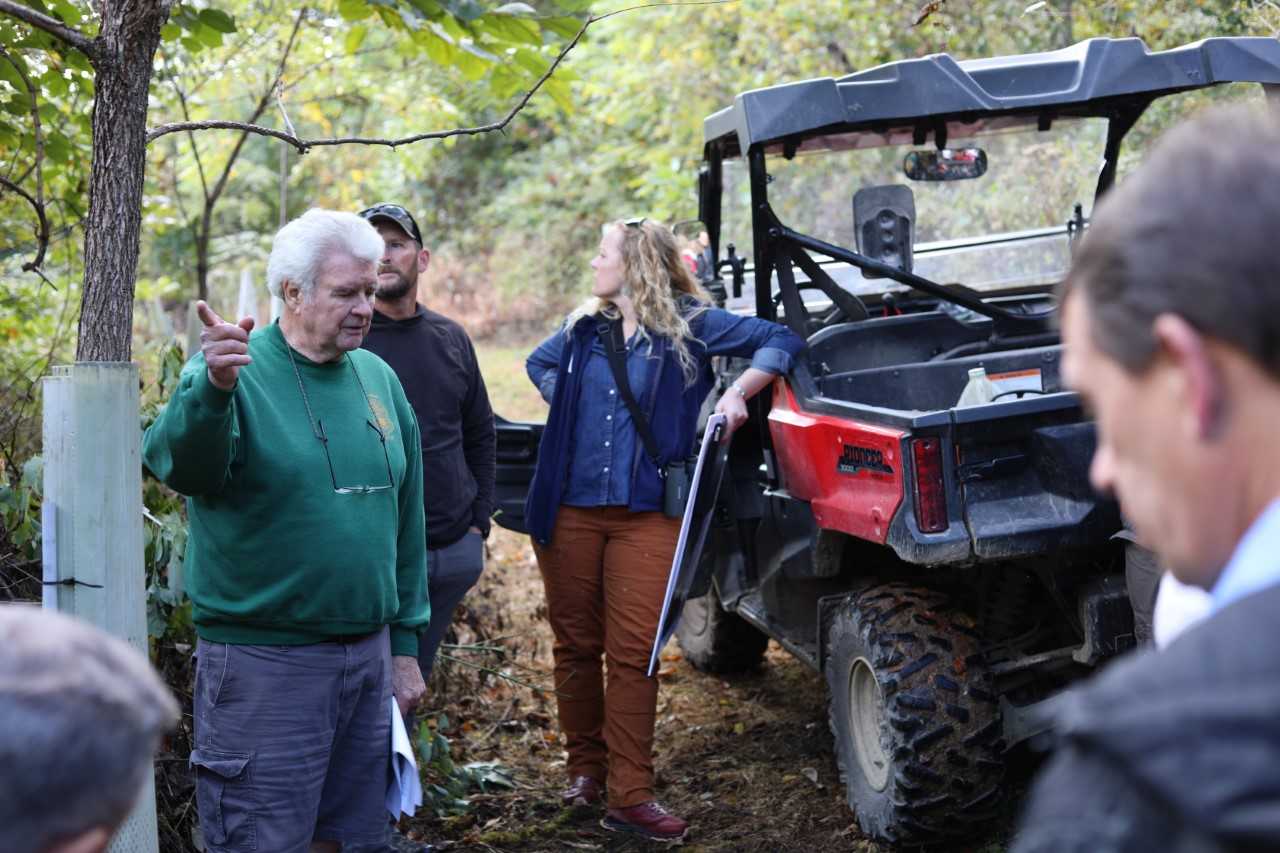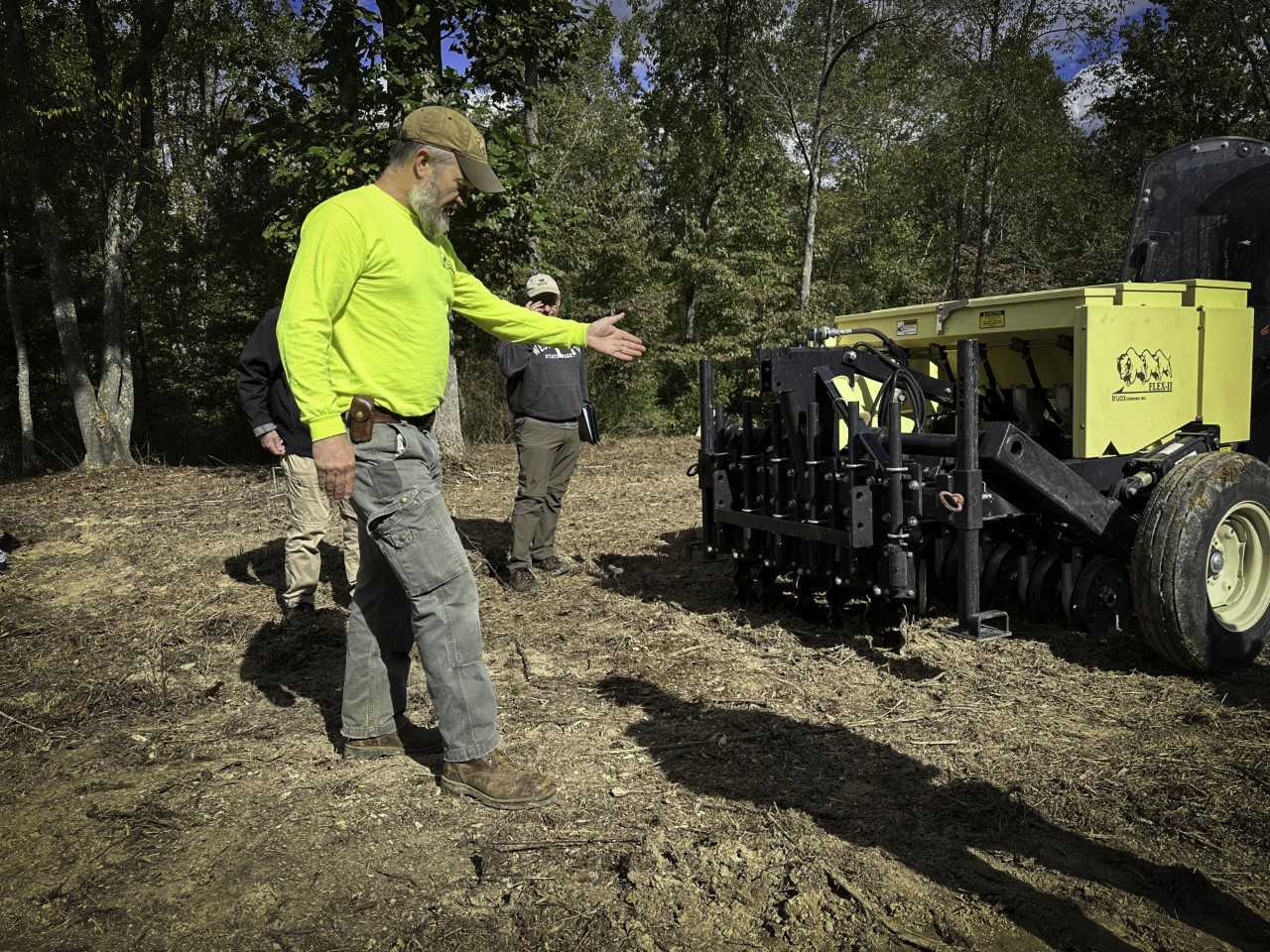by Liz Brewer, AMJV Outreach Specialist
Appalachian Mountains Joint Venture (AMJV), in partnership with the National Wild Turkey Federation (NWTF), USDA Natural Resources Conservation Service (USDA-NRCS), and the West Virginia Division of Natural Resources (DNR) and Division of Forestry (DOF), organized a field day to showcase their joint efforts to improve private lands for wildlife in West Virginia. Wendy Madden, representing Senator Manchin, and Todd Gunter, representing Senator Capito, attended the event to tour the work implemented through Farm Bill and Forest Stewardship programs.

Field day attendees paused the tour to take a group photo in commemoration of the day. From left to right: Ashley Peele (AMJV), Todd Fearer (AMJV), Wendy Madden (Representative, Senator Manchin), Julie Stutler (NRCS), Todd Gunter (Representative, Senator Capito), Robert Kuhn (True North Forestry LLC), Travis Miller (WVDOF), Danny James (WVDOF), Jeremy Jones (WVDOF), Liz Brewer (AMJV), Chuck Copeland (WVDOF), Kevin Gregory (Eagle Land Transformations LLC), Tom Wilsoncroft (NRCS), John Cobb (Landowner), Scott Warner (WVDNR), Nick Millett (USFWS), Daniel Consolvo (AmeriCorp), Paul Johansen (WVDNR), Riley Krumenaker (AmeriCorp), Cully McCurdy (NWTF), Bob Blagg (Landowner), and Kelsey Andrews (USFWS). Photo courtesy of Becky Haddix (NRCS).
The field day was hosted by local landowner John Cobb on his 365-acre property in Ireland, West Virginia where he has worked to improve the health of his forest and create habitat for wildlife. Cobb worked with state foresters to develop a Forest Stewardship plan for his woodlands. Having a stewardship plan allowed him to apply for financial assistance through Farm Bill programs in order to implement the management recommended in his plan. Cobb has since participated in many Farm Bill programs, including AMJV’s Regional Conservation Partnership Program that aimed to improve habitat for the declining Cerulean Warbler.

John Cobb shows attendees a young walnut tree he planted and discusses the importance of using tree guards to protect growing trees from damage by deer and bear. Photo courtesy of Amanda Duren (AMJV).
The tour of Cobb’s woodlands took attendees to see a forest stand that was managed to improve habitat for the Cerulean Warbler. The partners discussed what forest management practices were used to improve the habitat and why, along with an overview of the suite of other wildlife species that benefit from the management. The tour route included brief stops to view Cobb’s recent tree plantings, the trail cameras installed to track wildlife using his property, and the invasive plant removal he has worked on. The route ultimately led attendees to his most recent project: creating habitat for pollinators. The US Fish and Wildlife Service and their AmeriCorp volunteers joined to talk about how they prepare a field for planting and demonstrate the process. Neighboring landowner Kevin Gregory wrapped up the field day by highlighting how the Forest Stewardship and Farm Bill programs have been essential to managing his own property and helping other landowners manage theirs through his wildlife consulting business.

Nick Millett (USFWS) shows attendees the equipment they use to prepare the land for a pollinator planting. Photo courtesy of Becky Haddix (NRCS).
Attendees enjoyed an opportunity to mingle on Cobb’s back deck overlooking areas of his woods that had been managed with assistance from Farm Bill conservation programs. Partners highlighted the role their organizations play in bringing private lands management to fruition in West Virginia. Both Madden and Gunter expressed that partners could expect continued support for the Farm Bill programs from Senators Manchin and Capito. At the end of the day, Madden commented on how elucidating it was to see the strong partnerships in West Virginia that make this work possible.
The Appalachian Mountains Joint Venture is a regional partnership of over 55 state and federal agencies, conservation organizations, and universities committed to the conservation of habitat for the benefit of birds, wildlife, and people in the core of the Appalachian region.
Through voluntary conservation programs NRCS helps agricultural producers, forestland owners, soil and water conservation districts, and other partners protect and conserve natural resources on private lands throughout the United States. For more than 80 years, they helped people make investments in their operations and local communities to keep working lands working, boost rural economies, increase the competitiveness of American agriculture, and improve the quality of our air, water, soil, and habitat.